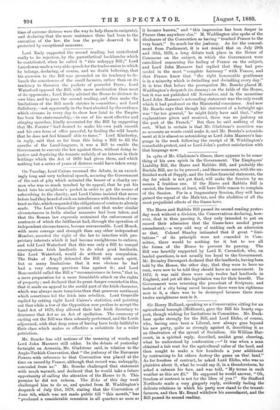Lord Emly supported the second reading, but contributed really to
its rejection, by the parenthetical backhander which he contributed, when he called it "this unhappy Bill ;" Lord Lansdowne made a very able speech for the trades-union to which he belongs, declaring, of course, and no doubt believing, that his aversion to the Bill was grounded on its tendency to de- bauch the consciences of the small farmers, rather than on its tendency to threaten the pockets of powerful Peers ; Lord Waterford opposed the Bill, with more moderation than most of its opponents ; Lord Derby advised the House to distrust its own bias, and to pass the second reading, and then make the limitations of the Bill much stricter in committee ; and Lord Salisbury,—not apparently in the least abashed by the evidence which streams in every day to show how fatal to the Empire has been his statesmanship,—in one of his most effective and stinging speeches, kindly accounted for the Bill by suggesting that Mr. Forster " had desired to make his own path smooth and his own term of office peaceful, by feeding the wild beasts that he does not feel himself able to tame." Lord Kimberley, in reply, said that so far from this being a Bill to fill the mouths of the Land-leaguers, it was a Bill to enable the, Government to execute the law against them, without doing in- justice and depriving the tenants unfairly of an interest in their holdings which the Act of 1870 had given them, and which nothing but a series of years of distress could have taken away.


































 Previous page
Previous page